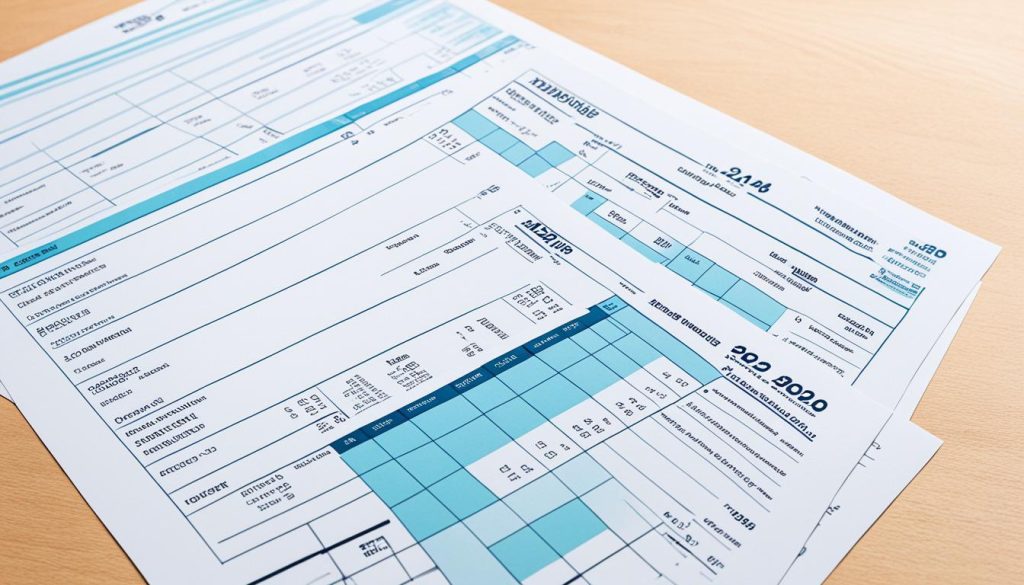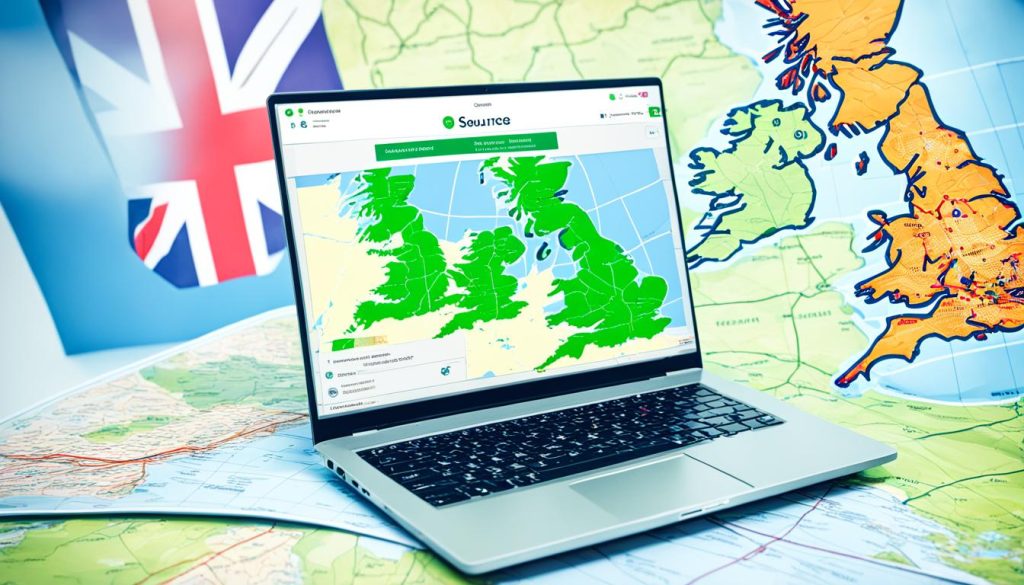Freelancing in the UK, from consultancy to IT work, is more popular than ever. People are attracted to the freedom and the chance to work on jobs they love. But, starting a successful freelance business demands serious thought and effort.
- Comprehending the Freelancing Realm
- Transitioning from Employment to Freelancing
- Establishing Your Freelancing Business Structure
- Sole Trader vs Limited Company: Weighing the Pros and Cons
- Freelancing Business Setup: A Comprehensive Guide for UK
- Registering as a Self-Employed Freelancer
- Pricing Your Freelancing Services
- Invoicing and Payment Collection
- Managing Finances and Taxation
- Crafting Your Brand and Marketing Strategy
- Building a Portfolio and Showcasing Your Work
- Source Links
Key Takeaways
- Freelancing provides flexibility, freedom, and the opportunity to work on fulfilling projects.
- Setting up a successful freelance business requires thorough planning and execution.
- UK freelancers have a variety of options, including freelance consulting, coaching, and IT contracting.
- Careful consideration of the pros and cons of sole trader or limited company status is essential.
- Effective financial management, invoicing, and marketing strategies are crucial for freelancing success.
Comprehending the Freelancing Realm
Freelancing is becoming more popular in the United Kingdom. It gives people the chance to work as they want. Basically, it means working for different clients on different projects, not for just one company. Freelancers use their special skills to help businesses for short times.
Defining Freelancing: A Flexible Career Path
Freelancing is all about being flexible and free. Freelancers choose what they work on and who they work with. This way, they can do work that they love and that fits them, making work more enjoyable.
Advantages and Challenges of Being a Freelancer
The good parts of freelancing are working on many projects, having control over your work and life, and maybe making more money. It also means learning a lot and seeing different types of work.
But, being a freelancer has tough parts too. You have to handle your money, sell your skills, and keep finding people to work with. Also, not having a steady pay means you need to manage your money very well.
Transitioning from Employment to Freelancing

Thinking of becoming a freelancer? It’s vital to check if you’re ready. Look at your money matters. Think about what you need to do and your work habits.
Can you keep going without a boss telling you what to do? Will you find the oomph to work hard every day on your own?
Evaluating Your Readiness for Self-Employment
Switching to freelancing means really thinking about where you stand and where you want to go. Look at your savings and debts. And don’t forget about the bills you must pay.
Do you have what it takes to impress as a freelancer? Look at your skills, experience, and who you know. Also, think about how good you are at time management. Can you stick to a plan without someone checking on you?
Cultivating a Mindset Shift
Going from a regular job to freelancing is a big change in thinking. Freelancers don’t just work, they run their own show. This means handling everything from finding clients to making sure you get paid on time.
Seeing yourself as your own boss takes work. But getting this mindset right is key to making it as a freelancer.
Establishing Your Freelancing Business Structure
If you’re starting as a freelancer in the UK, you must decide on your business’s legal setup. The first step is choosing between being a sole trader or a limited company. This decision affects your taxes and how much your personal assets are at risk.
Operating as a sole trader makes you the only boss of your business. It’s straightforward to set up and run, with less paperwork than a limited company. However, your personal stuff could be in danger if your business has money problems.
Choosing a limited company option means your business is seen as separate from you. This can protect what you own if your business faces debts. Yet, you’ll need to handle more paperwork and meet financial rules, like submitting yearly accounts to Companies House.
Thinking carefully about what matters most to you and your business will guide you. It’s wise to talk to an accountant or a solicitor. They can help with choosing the right setup for your freelancing adventure.
Sole Trader vs Limited Company: Weighing the Pros and Cons
When starting a freelance business in the UK, you have to choose its legal structure. You can go solo, often called a sole trader, or set up a limited company. Both options have their own benefits and drawbacks, so it’s wise to think things through.
Understanding Sole Trader Status
In a nutshell, being a sole trader means you’re in charge with no one else to answer to. It’s easier to start and run this setup as you deal with less paperwork. You would report your business’s income when you do your personal taxes. Plus, as a sole trader, you have full say over everything.
Exploring Limited Company Formation
Setting up a limited company makes your business a separate legal entity. This move can safeguard your personal savings and assets. But, it comes with extra rules and more financial paperwork. However, having a limited company might make your business look more serious. This can help you grow bigger or attract top-drawer clients.
Freelancing Business Setup: A Comprehensive Guide for UK
This guide is for UK freelancers who want to start and grow their business. It covers everything you need to know from the start to running it successfully.
Being a freelancer means more flexibility in your work. You can choose what projects to work on and when to work. You might even earn more than in a regular job. But, starting a freelance business takes planning and hard work.
We will discuss important topics in this guide, such as:
- Finding out if you are ready to work for yourself and building a winning attitude
- Deciding on the right business form, like a sole trader or a limited company
- Signing up with HMRC and learning about your tax duties
- Setting your prices after checking the market and knowing your value
- Sending invoices and making sure you get paid on time
- Keeping track of your money well and managing your books properly
- Creating a strong brand and marketing it well
- Putting together an impressive portfolio to show off your skills
By the end, you’ll know how to start and successfully run a freelancing business in the UK. This guide will help you grow and do well in this creative work.
Registering as a Self-Employed Freelancer

Freelancers need to sign up with HM Revenue & Customs (HMRC) as self-employed. This step includes telling HMRC they plan to work for themselves. They also must figure out how to pay income tax and National Insurance.
Navigating HMRC Registration Process
Registering with HMRC is quite simple for self-employed people. They just need to make a Government Gateway account. Freelancers should give some personal info and explain what they’ll be doing.
HMRC will then send a Unique Taxpayer Reference (UTR) number. This number is vital for doing annual tax reports.
Deadlines and Potential Penalties
Self-employed workers must sign up with HMRC before their first tax year ends. Or they should register by 5 October in the next tax year. Doing this late could mean fines and interest charges from HMRC.
Pricing Your Freelancing Services
Setting the right price for what you offer as a freelancer is key. You need to look at what others in your field charge. Understanding the market helps you set a rate that is fair to you and your clients.
Conducting Market Research
Knowing what your competitors or peers charge is crucial. You could look at job boards online, read industry magazines, or talk to other freelancers you know. This way, you can figure out how to charge while making sure you’re not undervaluing your work.
Factoring in Experience and Expertise
Your experience and what you specialise in also matter when it comes to your rate. If you have a lot of experience, a solid track record, or work in a unique area, you can ask for more. Showing the value you bring helps you justify your price to potential clients who are looking for quality.
Invoicing and Payment Collection

Managing invoices well is key for freelancers. They must draft neat invoices showing what they did, their rates, and when they should be paid. This helps get paid on time and shows how valuable and professional the freelancer is.
Crafting Professional Invoices
Freelancers should include these in their invoices:
- A clear and concise description of the services rendered
- The applicable hourly rate or project fee
- The total amount due, including any applicable taxes or expenses
- The payment due date and preferred payment methods
- The freelancer’s business name, contact information, and any relevant registration or tax numbers
An invoice that’s neat and well-designed shows a freelancer’s professionalism. It can also help to strengthen the bond with their clients.
Strategies for Chasing Late Payments
Sometimes, clients are late with payments. It’s then up to freelancers to act smartly to keep their money coming on time. This is crucial for their business to keep running smoothly financially.
Here are some tactics for dealing with late payments:
- Sending polite reminder emails or making follow-up phone calls to the client
- Offering flexible payment options, such as installment plans or accepting credit card payments
- Clearly outlining the consequences of non-payment, such as the application of late fees or the suspension of further work
- Seeking assistance from professional debt collection agencies or legal counsel if the client remains unresponsive
Addressing late payments proactively and keeping in touch with clients can ease the blow on a freelancer’s cash flow. This safeguard’s the business’s financial health.
Managing Finances and Taxation
Running a freelance business successfully involves careful financial management. Freelancers need to keep detailed records of their income and outgoings. This helps them follow tax rules and make smart business choices.
Bookkeeping and Accounting Essentials
It’s important for freelancers to have a solid bookkeeping system. They might use tools like QuickBooks or Xero to track money coming in and going out. By keeping precise records, tax time becomes much simpler. Plus, it lets freelancers see how their business is doing financially.
Understanding Tax Obligations
Freelancers must work out and pay their own income tax and National Insurance. They do this by doing a self-assessment tax return each year and making payments to HM Revenue & Customs (HMRC). It’s crucial for freelancers to know the tax deadlines and avoid penalties by meeting HMRC’s rules.
Crafting Your Brand and Marketing Strategy

In today’s freelance world, it’s key to have a strong brand that stands out. People need to show what makes them special to clients. They should figure out what they’re really good at and who they want to work with. Then, they create a brand that catches the eye.
Defining Your Unique Selling Proposition
Finding what makes you different is crucial for freelancers. It could be a unique skill, a deep knowledge of an industry, or a fresh way of solving problems. Once they know what sets them apart, they can attract the clients they’re aiming for.
Leveraging Online and Offline Marketing Channels
Having a mix of online and offline ways to promote yourself is important. A good strategy includes a website showing your best work, being active on social media, and meeting people in your field. It’s also good to have a collection of work and reviews from happy clients.
Building a Portfolio and Showcasing Your Work
A strong portfolio is key for freelancers. It lets them show off their skills and experience. It also shows the quality of their work to anyone who might hire them. For the best results, freelancers should choose their top projects and include feedback from happy clients.
Choosing diverse projects is important when making your portfolio. This shows the full range of what you can do. You might pick projects from various industries or for different kinds of clients. This helps you catch the eye of many different people looking for help.
It’s not just your work that should be in your portfolio. Including positive feedback from clients and the results you achieved is vital. This ‘social proof’, like testimonials and case studies, can really help build trust with new clients. Make sure you get your clients’ permission to share their thoughts and focus on what you accomplished together.
Your portfolio is your chance to shine and really stand out from others. Putting in the effort to pick and present your work well can pay off big time. It’s about showing how good you are at what you do and why clients should choose you over anyone else.












